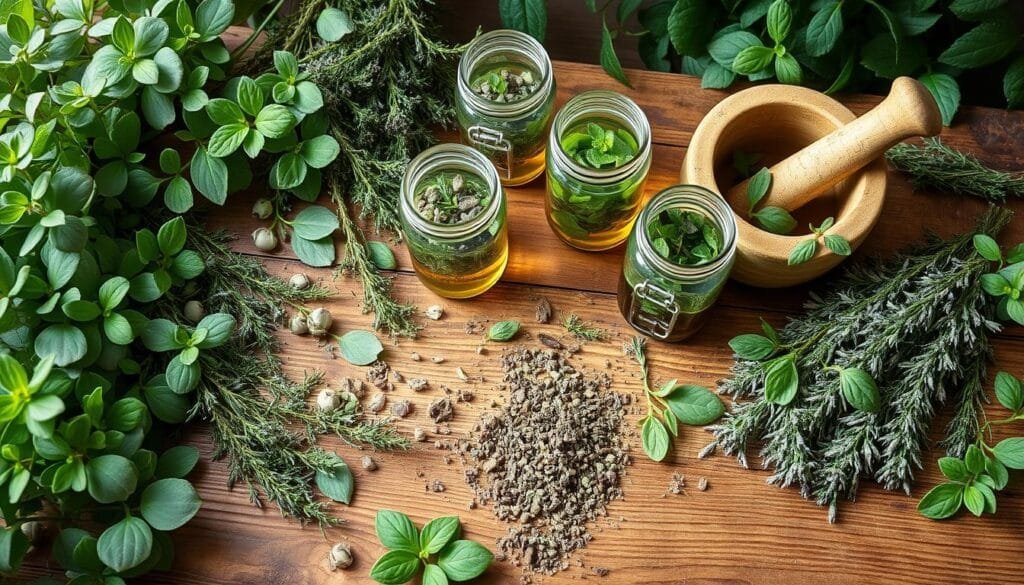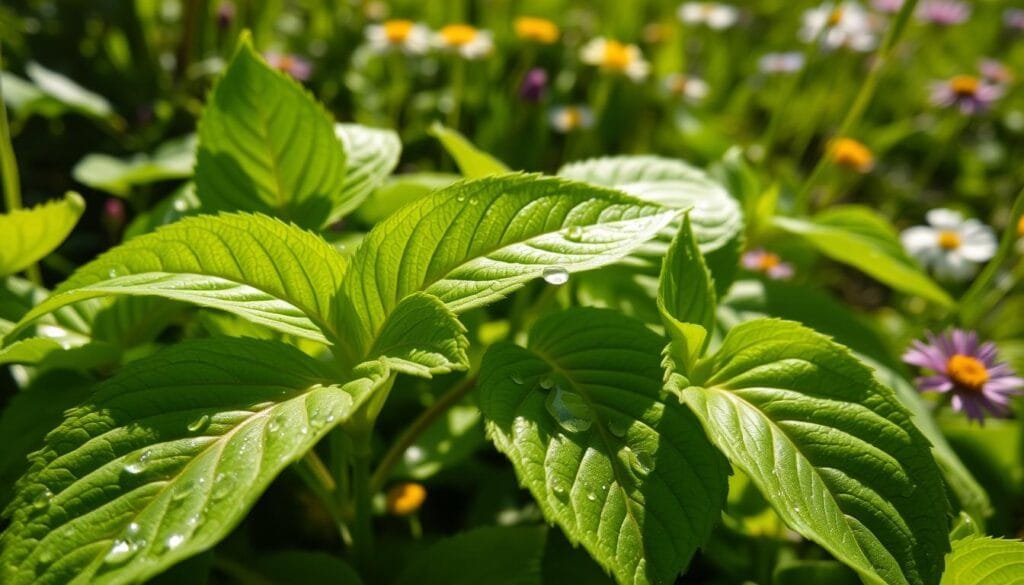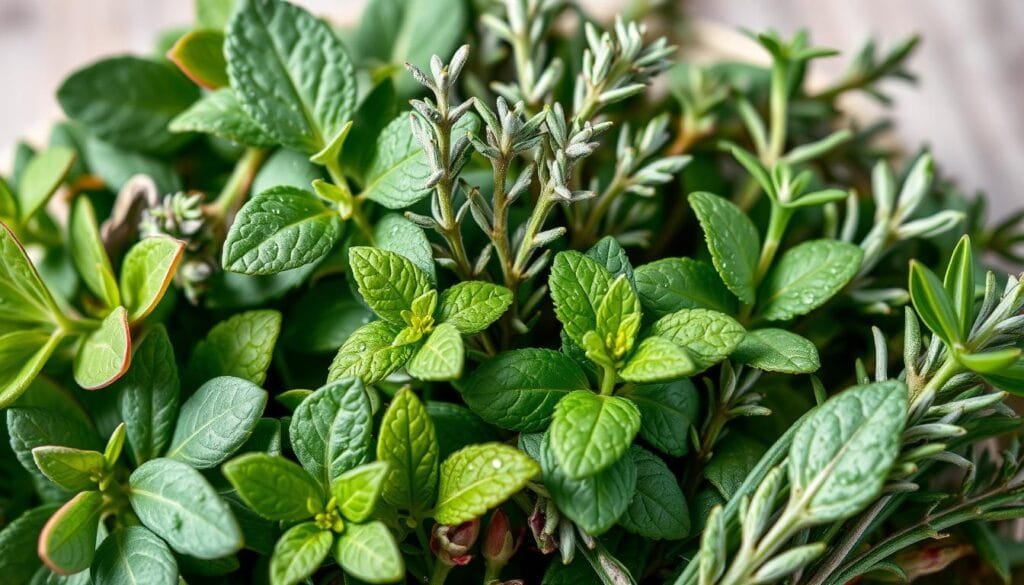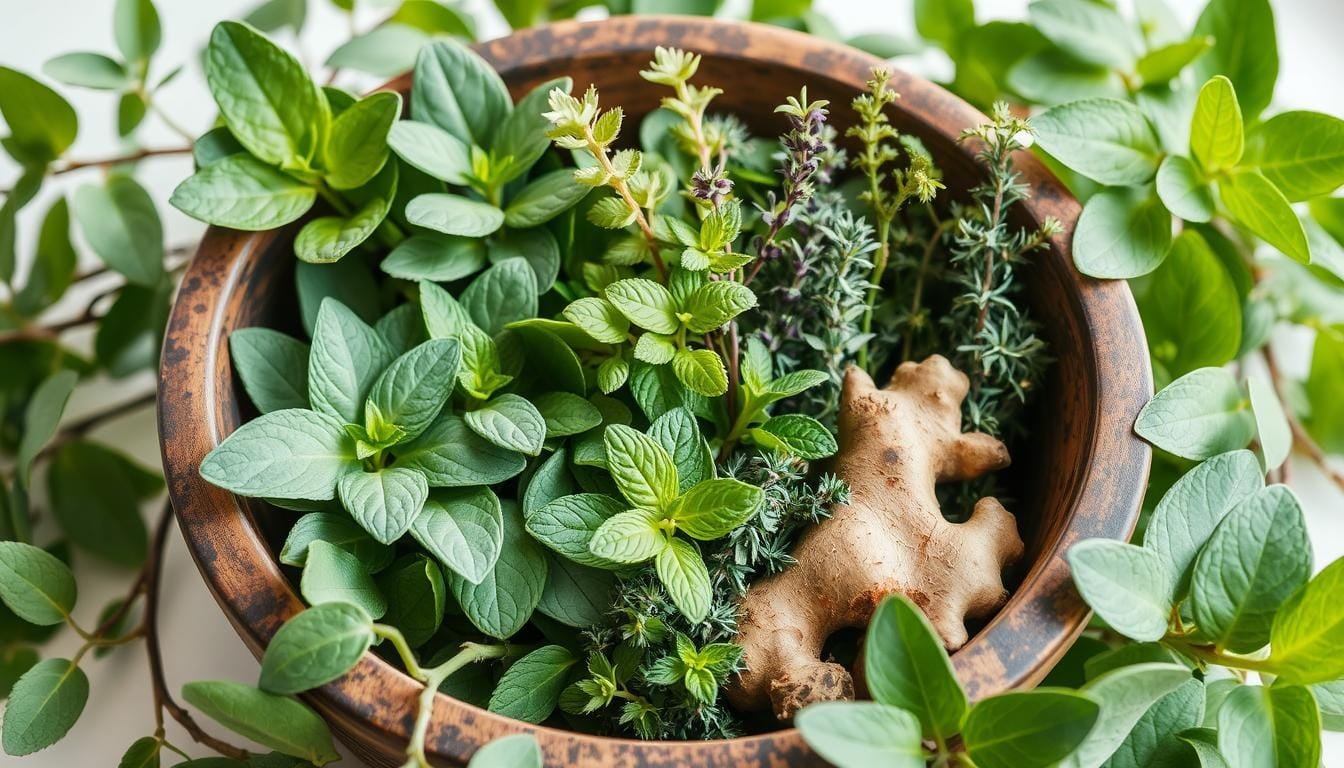I’m excited to share a guide on natural health solutions for your respiratory wellness. We’ll look at herbs like mullein and marshmallow. Each one has special benefits for your lungs and breathing.
Are you fighting asthma, bronchitis, or allergies? This guide will help you use plants to heal. We’ll cover how to use these herbs, from growing to using them. You’ll learn how to choose the best herbs for your health.
Let’s explore the amazing world of herbal remedies together. Discover how they can improve your breathing and help you live a healthier life.
Understanding the Respiratory System and Its Functions
The respiratory system is a complex network of organs and passageways. It is vital for the process of breathing. It can be split into two main parts: the upper respiratory tract and the lower respiratory tract.
The Upper Respiratory Tract Components
The upper respiratory tract includes the nose, nasal passages, paranasal sinuses, throat, and the upper part of the larynx. These parts work together to filter, warm, and humidify the air. They prepare it for deeper travel into the body.
The Lower Respiratory Tract Anatomy
The lower respiratory tract includes the lower part of the larynx, the trachea, bronchi, bronchioles, and the lungs. This network, called the tracheobronchial tree, carries oxygen-rich air to the alveoli. There, gas exchange happens, and carbon dioxide is removed from the body.
How the Mucociliary Escalator Works
The mucociliary escalator is a key part of the respiratory system. It is found in both the upper and lower tracts. This system uses mucus and tiny hair-like structures called cilia to trap and remove particles, dust, and germs.
The mucus catches these unwanted elements. The cilia move the mucus up and out of the system. This can be coughed up or swallowed.
“Understanding the respiratory system and its components is key for good respiratory health.”
Essential Herbal Remedies for Respiratory Health
During the cold winter or when fighting off illnesses like COVID-19, natural herbal remedies can be very helpful. Certain herbs are great for soothing irritation, easing spasms, loosening mucus, and boosting lung function.
Thyme is a top choice for respiratory health, thanks to its antimicrobial and antibacterial properties. Kūmerahou, a plant from New Zealand, helps thin and clear mucus from the lungs. Hoheria, another New Zealand plant, is a great demulcent and expectorant, making it perfect for coughs and sore airways.
- White horehound, a European herb, helps with breathing and soothes sore throats and coughs.
- Akeake, with its anti-inflammatory and antimicrobial properties, aids in relaxed breathing and helps with pain and fever.
There are many more natural solutions for respiratory support. These include nettle leaves, goldenrod, bee balm, oregano, thyme, rosemary, elderberry, peppermint, and elecampane root.

“Herbal remedies can support respiratory health by maintaining the self-cleaning function of the respiratory system and promoting healthy mucus production and expulsion.”
Adding these herbal remedies, respiratory support, and natural solutions to your routine can help keep your airways clear. This ensures your lungs work well, even in tough seasons.
Mullein: The Supreme Respiratory Tonic
Mullein is a remarkable herb with a long history in traditional medicine. It’s known for opening the lungs, easing spasms, and soothing irritation. This makes it a key ally for natural respiratory health.
Harvesting and Preparation Methods
Mullein can be found in gardens or wildcrafted. Its leaves, flowers, and roots each offer unique benefits. You can make teas, syrups, steams, or tinctures to use its active compounds.
Therapeutic Benefits for Lung Health
Mullein is great for many respiratory issues. It has antioxidants and anti-inflammatory properties. These help with coughs, tightness, and dryness in the lungs.
It also has antimicrobial and expectorant qualities. These help clear mucus and support healthy lung function.
Studies show mullein helps with lung conditions like pneumonia and tuberculosis. It’s also used for allergies, sore throats, and tonsillitis. This is because antibiotic resistance is growing.
“Mullein is a powerful respiratory tonic that opens the lungs, eases spasms, and soothes irritation.”
Mullein contains flavonoids and saponins. These compounds have anti-inflammatory, antioxidant, and antimicrobial properties. This makes mullein a versatile and effective herb for lung health.
With its long history and scientific backing, mullein is the top choice for respiratory health. It offers a natural and gentle way to keep your lungs healthy.
Wild Cherry Bark Benefits for Respiratory Care
Looking for a natural way to ease your respiratory issues? Wild cherry bark is your answer. For centuries, Native Americans, like the Cherokee, used it for various respiratory problems. This includes stubborn coughs and bronchitis.
Wild cherry bark is famous for its ability to suppress coughs. It’s great for dry, irritated, and spasmodic coughs. Its sedative effects also help with coughs that keep you awake at night. But it does more than just calm coughs.
This bark contains compounds that help open airways and support breathing. It also reduces mucus, acts as an expectorant, and soothes inflamed airways.
Wild cherry bark is perfect for those affected by wildfires, lingering colds, or wanting to boost lung health. Always talk to your doctor before using it, as it might affect certain medications.

To get the most out of wild cherry bark, harvest it after the tree flowers and dry it well. You can make it into a tincture, tea, cold-processed honey, or syrup. Liquid forms work faster, but the right dose depends on your age and health.
Wild cherry bark is a natural ally for better breathing and cough relief. It’s a valuable addition to your wellness routine, thanks to its proven benefits and versatility.
Marshmallow Root: Nature’s Respiratory Soother
Marshmallow root is known for soothing the lungs and airways. It can be used in teas, infusions, syrups, and lozenges. These forms offer gentle relief for respiratory issues.
Methods of Using Marshmallow for Respiratory Support
To make a soothing tea, steep dried marshmallow root in hot water for 10-15 minutes. You can enjoy it plain or add honey for sweetness. For a milder option, make a cold infusion by soaking the root in room temperature water for hours.
Marshmallow root can also be made into a nourishing broth or syrup. These are great for soothing the throat and airways. You can also find lozenges or capsules for direct relief.
Combining Marshmallow with Other Herbs
Marshmallow root works well with other herbs for better respiratory support. Mixing it with licorice root, elecampane, or astragalus boosts its benefits. Adding thyme or ginger can also enhance its soothing effects.
By blending marshmallow root with other herbs, you can create personalized remedies. This approach offers a natural way to manage respiratory issues.
“In 2018, a study investigated the effects of marshmallow root extract in lozenges or syrups for dry cough treatment, showing that the treatments helped reduce irritation often within 10 minutes.”
| Herb | Key Respiratory Benefits |
|---|---|
| Licorice Root | Anti-inflammatory, protects lung tissue |
| Elecampane | Expectorant, antimicrobial |
| Astragalus | Immune-boosting, antioxidant |
| Thyme | Antimicrobial, bronchodilator |
| Ginger | Anti-inflammatory, improves circulation |
Horehound: Traditional Cough Relief Herb
Horehound is a member of the mint family and is known for its natural remedies for respiratory issues. It’s famous for helping with coughs, making it a key ingredient in cough drops and syrups.
The active compounds in horehound, like marrubiin, have great health benefits. Studies show it can help with cholesterol levels and pain relief.
Horehound is great for wet coughs with lots of mucus. It helps clear the airways and soothes irritation. This makes it useful for sinus infections, allergies, and post-nasal drip.
- Horehound grows best in sunny, dry spots. It tastes bitter, perfect for tinctures, syrups, or honey remedies.
- But, dried horehound from stores is often low quality. It’s better to dry the leaves yourself for teas, capsules, or other uses.
Horehound’s long history and versatility make it a great choice for natural respiratory health.
“Horehound is a famous cough drop and cough syrup ingredient that eases spasms and loosens mucus associated with wet coughs involving excessive mucus in various respiratory issues like sinus infections, allergies, chest congestion, and post-nasal drip.”
Plantain Leaf: A Common Weed with Powerful Benefits
Plantain leaf is a common weed in the United States. It has many benefits for your respiratory health. This plant is full of compounds that can calm irritation, dry out mucus, and help your respiratory system.
Harvesting and Processing Guidelines
Plantain leaf is easy to find and use all year. It’s most potent in spring and early summer. Look for its broad, ribbed leaves near the ground. Clip them gently, without harming the roots.
Wash the leaves well and dry them in a cool, shaded spot. Once dry, you can use them fresh or store them for later.
Applications for Respiratory Support
- Make a soothing tea from plantain leaf to ease coughs, sore throats, and irritation.
- Use the leaves to make a strong herbal syrup. It’s a natural way to stop coughs.
- Plantain leaf tastes mild and pleasant. It’s great in many recipes for respiratory health.
- Studies show it might also fight off infections, helping with respiratory problems.
Using plantain leaf can be a great way to boost your natural defenses. It’s a key part of any natural plan for better lung health.

“Plantain leaf is a true unsung hero in the world of herbal remedies, providing many benefits for the respiratory system. Its versatility and natural healing properties make it essential for anyone looking to support their lung health.”
Aromatic Herbs for Respiratory Support
Aromatic herbs are great for keeping your respiratory system healthy. These plants are full of fragrant compounds. They help support your breathing and overall health.
Fennel seed, thyme leaf, and eucalyptus are top choices for your lungs. They relax airway muscles, making breathing easier. This helps your respiratory system work better.
Oregano, rosemary, and peppermint are also good for your lungs. They have special properties. These can soothe your throat and help clear out mucus.
| Aromatic Herb | Potential Respiratory Benefits |
|---|---|
| Fennel Seed | Supports relaxation of airway muscles, potentially easing breathing |
| Thyme Leaf | Contains compounds that may help maintain respiratory tract health |
| Eucalyptus | May help support clear airways and promote respiratory function |
| Oregano | Possesses antioxidant and anti-inflammatory properties that can benefit the respiratory system |
| Rosemary | Offers antioxidant support to help maintain lung health |
| Peppermint | May help soothe the throat and promote respiratory comfort |
Adding these herbs to your routine can boost your respiratory health. Always talk to a doctor before trying new herbal remedies.

“The fragrance of herbs will hang round them long after their withering, and so it is with the deeds of a good man.”
– Henry Wadsworth Longfellow
Herbal Preparations and Dosage Guidelines
Herbal remedies can be a big help for your respiratory health. You can choose from soothing teas to energizing tinctures. Let’s look at the main herbal preparations and how much to take to breathe better.
Teas and Infusions
Drinking herbal teas is a soft and effective way to help your breathing. Herbs like mullein, wild cherry bark, and marshmallow root make great teas. To get the most out of them, steep the herbs in hot water for 10-15 minutes. Enjoy 1-3 cups a day.
Tinctures and Syrups
Herbal tinctures and syrups pack a strong punch of plant medicine. Tinctures, made with alcohol, should be taken in 30-60 drops, 1-3 times a day. Syrups, sweetened with honey or glycerin, are easier to take. Take 1-3 teaspoons a day.
It’s key to stick to the recommended dosages. Taking too much might not help. Always talk to an herbalist or healthcare expert for advice, if you have health issues or take medicines.
“The right herbal preparation and dosage can make all the difference in supporting your respiratory health.”
Knowing about herbal preparations and how to use them can help keep your respiratory system healthy. Remember, herbal remedies are not for everyone. Be patient and work with your healthcare provider to find what works best for you.
Supporting Respiratory Health with Demulcent Herbs
Keeping our respiratory system healthy is key to our well-being. Demulcent herbs like marshmallow root, slippery elm, and licorice root are great for this. They have soluble fiber that soothes and moisturizes our respiratory tissues.
These herbs are great for throat health and keeping the respiratory tract’s lining healthy. They create a soothing layer that helps ease discomfort and supports our respiratory system’s natural functions.
| Demulcent Herb | Key Benefits |
|---|---|
| Marshmallow Root | Soothes and moisturizes respiratory tissues |
| Slippery Elm | Promotes healthy mucous membranes |
| Licorice Root | Supports immune function and reduces inflammation |
Adding astringent and mucolytic herbs to demulcent herbs can also help our respiratory health. Astringent herbs like elderflower, rosehips, and yarrow flower help tone our respiratory tissues. Mucolytic herbs, on the other hand, help clear airways by breaking down mucus.
By mixing demulcent herbs with aromatic herbs, we can create a powerful blend for our respiratory health. Look into the many herbal remedies out there and find what works best for you.
“Demulcent herbs are a true gift from nature, providing gentle yet effective support for our respiratory health.”
Combining Herbs for Enhanced Respiratory Benefits
Herbal combinations are powerful for supporting respiratory health. Mixing different herbs can create effects that are greater than the sum of their parts. This way, we can get a full range of benefits for our respiratory system.
For example, mixing demulcent herbs like marshmallow root with aromatic herbs like eucalyptus can soothe and clear airways. Expectant herbs like wild cherry bark, when combined with soothing herbs like licorice root, help clear mucus and calm irritation.
When making your own blends, think about your health needs, the climate, and specific respiratory issues. This way, your blends will be just right for you, giving you the best support.
Understanding how herbs work together is key. By blending different plants, you can make formulas that work with your body’s natural healing. This helps keep your respiratory system healthy.
“The secret of getting ahead is getting started. The secret of getting started is breaking your complex overwhelming tasks into small manageable tasks, and then starting on the first one.” – Mark Twain
So, start exploring herbal combinations for better respiratory health. Your lungs, sinuses, and overall health will appreciate it.
To boost your respiratory health, try adding herbs like Schisandra, Yarrow, and Black Seed Oil to your routine. These herbs have been used for ages to keep lungs healthy and fight off toxins.
- Schisandra is traditionally used for maintaining healthy lungs and combating toxins in the environment.
- Yarrow has a long history of use in European and Asian herbal medicine to support lung and respiratory health.
- Black Seed Oil has been utilized for thousands of years to promote lung, sinus, and respiratory wellness.
By using herbal combinations and adding these plants, you can actively support your respiratory health. This helps keep your lungs and overall well-being in top shape.
Safety Considerations and Precautions
Exploring herbal remedies for better breathing is exciting. But, it’s vital to think about safety and how they might interact with other things. Some herbs can affect how medicines work or might not be good for everyone. Always talk to a doctor or a skilled herbalist before starting any new herbal treatment, if you’re on meds or have health issues.
Knowing about herbal safety is key. Some herbs might not get along with your meds or could be bad for you in certain situations. It’s important to do your homework and get advice from reliable sources. This way, you can use these natural helpers wisely and safely.
Learning about herbal safety is a big part of using them for better breathing. I aim to stay up-to-date on the safe use of these natural allies. With careful research and the right advice, I’m sure I can safely add them to my health routine.






